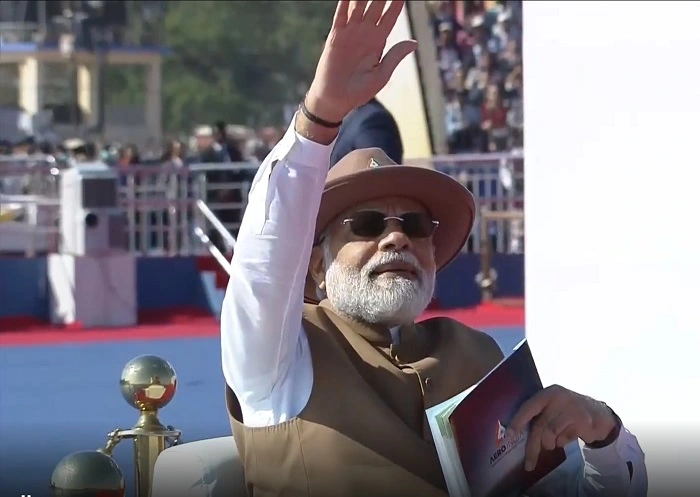

PM Modi is expected address key combined commanders’ conference in Bhopal where India’s top commanders will spend most of their quality time understanding how future wars are to be won given that tactics have to be shaped by huge advancements in military technology
Prime Minister Narendra Modi is expected to address next month’s Combined Commanders Conference (CCC), which will be a major brainstorming exercise to seek derivatives from modern wars where stand-off weapons and drones have been used with telling effect.
The three-day tri-service conference will be held in Bhopal from March 30, the Hindustan Times is reporting. Accompanied by Defence Minister Rajnath Singh PM Modi is expected to address the meet on the third and final day.
The India-China standoff, at a time when Beijing is modernising its arsenal with stand-off weapons and drones adds a sense of urgency to this conference. Besides, lessons need to be learnt from the on-going Ukraine war, where Kiev has retarded Moscow’s advance using modern western-supplied weapons, despite the conventional balance of power favouring Russia.
While the improvement of the Agniveer/Agnipath schemes will be on the radar, India’s top commanders are expected to spend most of their quality time understanding how future wars are to be won given that tactics have to be shaped by huge advancements in military technology.
Apart from studying the long distance use of missiles, long range artillery and unmanned aerial vehicles, the commanders are expected to analyse Ukraine’s extensive use of shoulder fired anti-tank weapons, which appears to erode Moscow’s overwhelming edge in armour and mechanised infantry to mount rapid advances on the ground.
Regarding China, the People’s Liberation Army has developed a wide array of missiles, including ballistic missiles that can target aircraft carriers, US bases such as Guam as well as hypersonic missiles. Besides, it has focused on surveillance and armed drones, including the Wing Loong II. Given Beijing’s special relationship with Islamabad steeled with transfer of modern weapons, India planners have their task cut out to quickly develop weapons that can deter hostile neighbours from opting for the use of forces.
The commanders are also likely to analyse the Azerbaijan-Armenia conflict where the use of Turkish Bayraktar drones became the X-factor in quickly tilting the scales of war in Baku’s favour against Yerevan.
According to the HT report, the role of information war, spearheaded by a weaponised social media will be a hot topic for discussion in Bhopal. It points out that an advanced adversary uses social media to spread disinformation, spread disaffection, radicalization, and chaos against its enemies.
Along with mounting cyber-attacks as part of its toolkit, Chinese have been specialising in hybrid-warfare using information warfare to keep its foes off-balance and in a reactive mode.
The Pakistani military and deep state are well versed in championing false narratives using social media, targeting India through their agent provocateurs, analysts said.
The Commanders are also expected to deliberate on the Indo-Pacific in-tune with India’s broadening horizons in the maritime domain, including defence of its 7500 km long coastline.
Also Read: Are Iranian drones becoming the X-factor in war between Russia and Ukraine?
Cyprus President Nikos Christodoulides and Prime Minister Narendra Modi on Monday viewed the mountains near…
Cyprus President Nikos Christodoulides said he and Prime Minister Narendra Modi discussed expanding bilateral ties…
Prime Minister Narendra Modi said on Monday that India and Cyprus will develop a strong…
The European Union and China conducted the 40th iteration of their Human Rights Dialogue on…
Prime Minister Narendra Modi was awarded the Grand Cross of the Order of Makarios III…
External Affairs Minister S Jaishankar held a telephonic conversation with his UAE counterpart Sheikh Abdullah…